Posts Tagged ‘Chapman University’
Tuesday, June 4th, 2013
By Carolyn Yeager
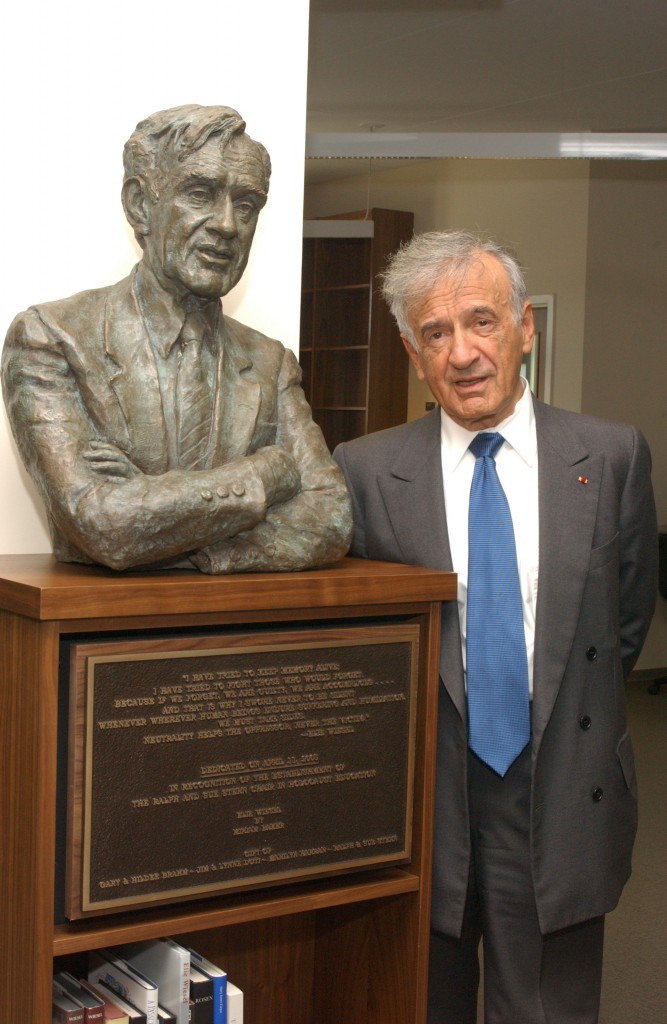 Elie Wiesel did not have a visit with Chapman University students this spring. Up until this year, he had completed only two years of his five-year appointment as a Distinguished Presidential Fellow at the university. 2013 would have been year three. Wiesel previously arrived at the end of March or in April for about five days. Now it is already June and school is out.
Elie Wiesel did not have a visit with Chapman University students this spring. Up until this year, he had completed only two years of his five-year appointment as a Distinguished Presidential Fellow at the university. 2013 would have been year three. Wiesel previously arrived at the end of March or in April for about five days. Now it is already June and school is out.
I searched the March 2013 archives of The Panther, Chapman U’s student-run newspaper, and found nothing. It always covered Wiesel’s visits in the past.
The last public appearances that I know of are his speech at Kent State University in Ohio on April 11th, and his participation in the U.S. Holocaust Memorial Museum (USHMM) 20th anniversary on April 28-29, during which he had to meet lots of people. He looked frail at both events and I imagine he didn’t think he had the energy for more than those.
I have a suspicious thought, however, that he simply ran out of anything of even pretend-value to say to young students, and is now begging off his 5-year appointment. I think at the time, shortly after the Bernard Madoff scandal broke, Wiesel felt he needed money and the California Jewish funders of Chapman University’s holohoax wing came up with this idea. Wiesel grabbed it, but now doesn’t care as much, being that his son is a Vice-President at Goldman Sachs. He’s probably made up his losses already.
Wiesel had heart by-pass surgery last year, about which he wrote a book, naturally. So though he shouldn’t be having heart trouble, we may be seeing quite a bit less of him from now on. At 84, he needs to conserve his energy.
Pictured right: Elie Wiesel in younger days poses with a large bronze bust of himself that adorns the entrance to the Sala and Aron Samueli Holocaust Memorial Library at Chapman University. It opened in April 2005 and is like a little holocaust museum right there on university grounds.
* * *
I have updated the Page titled “Famous Photo of Buchenwald Survivors”, which is accessed under “The Evidence” > “Photographic Evidence” on the upper menu bar. I hope you will take a look at it. I’ve added quite a bit to what was there, and also removed some things that I no longer agree with.
This photograph is an amazing study in the use of photo-montage and general photo-manipulation by the U.S. Army OSS, and the false claims by “survivors” to be in the picture. In many cases, it seems to be mainly ego-gratification–to claim to be in an iconic image representing an important historic time of one’s people. But there is also in some cases a desire to add one’s own “witness” to the false ideas attributed to Buchenwald–a climbing on, so to speak. Such a willingness to bald-face lie is hard for non-Jewish people to fathom.
No Comments
Category Featured | Tags: Tags: Bernard Madoff, Chapman University, Distinguished Presidential Fellow, Elie Wiesel, Famous Photo of Buchenwald Survivors, Goldman Sachs,
Social Networks: Facebook, Twitter, Google Bookmarks, del.icio.us, StumbleUpon, Digg, Reddit, Posterous.
Wednesday, March 13th, 2013
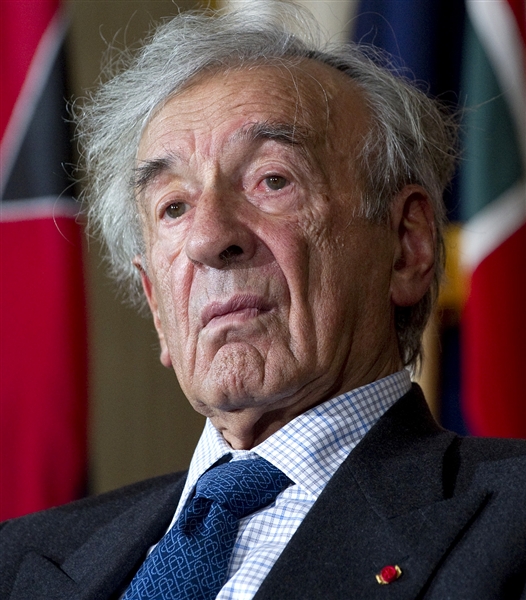
By Carolyn Yeager
Have you ever wondered that? I sure have. If this website Elie Wiesel Cons The World is telling lies about him, it would be the natural thing to do. In the same vein, if Elie Wiesel has the number A7713 tattooed on his arm, as he says he does, it would be very easy to show it to the world and put me out of business. It is inexplicable that he doesn’t do it if he could. The only logical conclusion to reach is that he can’t … because he doesn’t.
Not only does Elie Wiesel not sue me, he doesn’t go after Nikolaus Grüner either, who called him a liar before I did. Grüner did try to sue Elie Wiesel, though, but was prevented from doing so by the courts and legal systems that protect Wiesel according to Zionist orders.
I’m told the United States Holocaust Memorial Museum closely follows this blog. I have said many negative things about the museum, too. For instance, that it is a criminal conspiracy to defraud the American people — certainly to defraud the American taxpayers out of fifty or so million dollars a year. I have accused the USHMM of blatant lying, of perpetuating false information even after it knows it is false, of creating an atmosphere of hate against anyone Jews don’t like. And, yes, of being totally run by Jews for Jewish interests — not the interests of history — very similar to the OSI (Office of Special Investigations) in it’s disreputable and downright illegal tactics.
I will be doing a new article on the relationship between these organizations — in 2010 the OSI was merged into the Human Rights and Special Prosecutions Section of the Domestic Security Section of the Justice Dept.
Elie Wiesel and the USHMM – a mutually beneficial relationship
I have previously written about the symbiotic connection between Elie Wiesel and the national holocaust museum he was instrumental in creating in this country – the USA. Built in Washington D.C. on federal ground amidst the national monuments to American history, this parasitical monstrosity pretends to be something that helps to insure the American idea of freedom and democratic principles around the world!
A faithful reader recently wrote to me:
Did you know the USHMM was closely following your blog?
Two weeks ago, I landed on the Oral History site; I did not intend to watch the VDO, but scrolling down the page, saw there was a clickable link to the transcript of the interview in .doc or .pdf format. That’s quite handy and I downloaded a couple every day till the 26th, when I posted my comment [here at EWCTW] with a link to their site on one of the rare pages without a clickable link. Guess what? – on the evening of the very same day each and every link had been disabled.
Well these testimonies have been recorded in the late 80s or early 90s, before the advent of the net and they believed they could get away with telling anything … (Bomba tells he dug a bunker in the ghetto for 50-60 people, loading it with food for 2 YEARS, apparently in a matter of days … to fifth-graders).
I am not surprised at that. I too see changes based on what is exposed on Elie Wiesel Cons The World. Just one example is Wiesel’s now more secret visits to Chapman University after I so effectively panned his first visit as a “Distinguished Presidential Fellow” in March 2011, based simply on what I read in the local and campus newspapers. We also had a fellow, Steve, pass out flyers at a Wiesel talk during that same visit. Since then, Wiesel’s visits and talks have been handled differently. In his 2012 visit to Chapman, there was no publicity and Wiesel only appeared to students in very private and secure settings. So far, there have been no announcements of his 2013 visit that I have seen.
So they react, but they are careful not to ever mention this web site or my name in any way. To object in any way about it or me would mean they would have to show, demonstrate, prove, provide evidence or give testimony that I am wrong. They know beforehand they cannot do that because they know they are the liars, not me. They depend on the news and entertainment media to keep the public believing they have noble aims.
I would have to say that Elie Wiesel and the USHMM are afraid to touch this web site because of the deep research I have done, to which they have no answers or rebuttal. Without the power of the media covering for them, and all branches of the U.S. government backing them, they would wither and die from their lack of credibility.
Their chosen method is to stay in generalities and avoid specifics
The powers that are behind Elie Wiesel and the USHMM know that they can only succeed by using generalizations like “hate,” “genocide,” “anti-Semitism,” “religious persecution,” “6 million,” etc. along with such vague “legal” language as “stirring up racial hatred” and “encouraging contempt for individuals or groups”. No legal system that has acquiesced to what the Jews want in the way of protections for themselves will allow for introduction of evidence that actually pertains to truth or falsehood of specific elements of the narrative.
Both Elie Wiesel and the USHMM make specific charges against those they call the perpetrators of evil, but they will never answer to the denial by said “perpetrators” that they committed these evils. Via the total postwar power assumed by the victors of World War II (those who brought about WWII in order to gain this power!), this question was never allowed consideration. Again, it was the media that did the job.
Legal Definition of libel
1) n. to publish in print (including pictures), writing or broadcast through radio, television or film, an untruth about another which will do harm to that person or his/her reputation, by tending to bring the target into ridicule, hatred, scorn or contempt of others.
What I do here seems to fit that (apart from the word “untruth”), but there is no response from those who are so targeted. Of course, my intention is to discover and to tell the truth, not to slander. The only complaints I get are a few comments, and once in awhile an email, from ardent fans of Elie who chastise me for being insensitive to the man’s suffering — which to their illogic means to them he can have no reason to lie about it and would only tell the truth. (And if he doesn’t, well – that is excused on the same grounds.) To their thinking, Jewish suffering excuses all moral failings. These writers are mostly female and young, appearing as though they had looked up Elie Wiesel on the Internet, come upon this site and were shocked by it. Unfortunately, these young’uns would be the first to use the “chosen method” described above, that is, to judge harm done according to “selected” peoples’ feelings. That is the only way anyone will ever touch it.
7 Comments
Category Featured | Tags: Tags: Chapman University, Elie Wiesel, generalities vs specifics, libel, Nikolaus Grüner, OSI -Office of Special Investigations, slander, US Holocaust Memorial Museum,
Social Networks: Facebook, Twitter, Google Bookmarks, del.icio.us, StumbleUpon, Digg, Reddit, Posterous.
Friday, April 20th, 2012
By Carolyn Yeager
From the website of Chapman University:
Elie Wiesel will return to Chapman University on April 15-22. His annual one-week visit marks the second year of his five-year appointment as a Distinguished Presidential Fellow at the university. While on campus, Wiesel will meet with [selected] students and faculty and be a guest speaker in various classes.
This year, Wiesel plans to present four “Conversations” during his visit. The moderated discussions (which will be open only to the university community, not to the general public) will focus on themes central to his work and to the university community. Scheduled topics include:
- “Why Study?” (moderated by Daniele Struppa, Ph.D., Chapman University chancellor)
- “Why Write?” (moderated by English professor Patrick Fuery, Ph.D.)
- “Why Be Just?” (moderated by Tom Campbell, dean of Chapman University School of Law)
- “Why Believe?” (moderated by Gail Stearns, Ph.D., dean of the Chapman University chapel)
Chapman University President James L. Doti, Ph.D., sees this as another exceptional learning experience for the Chapman community. “Elie Wiesel challenges us to ask ourselves the big questions,” Dr. Doti said. “He believes that as human beings, we are defined more by the questions we ask than by the answers we give.* I am especially excited that our students will be able to join with Professor Wiesel in a week of questions and conversations. I know this week will have an impact on their years here at Chapman and on the way they look at the world.”
Elie Wiesel first visited Chapman University in April 2005, when he took part in dedication ceremonies for the university’s Sala and Aron Samueli Holocaust Memorial Library. His second visit came in April 2010, when he spoke to the university community and was guest of honor at a gala marking the 10th anniversary of the Rodgers Center for Holocaust Education and the Stern Chair in Holocaust Education. That same year, he accepted a five-year appointment as a Distinguished Presidential Fellow at Chapman University. In that role, Wiesel is invited to visit Chapman annually to meet with students and offer his perspective on subjects ranging from Holocaust history to religion, languages, literature, law and music.
* Here at Elie Wiesel Cons The World, we have defined ourselves by asking the same question “Where’s the Tattoo?” for two years, but have received no answer from the professor. If you pay attention, you will see that Wiesel’s whole ploy is to ask questions, while always saying, “I have no answers.” Only on the witness stand in a court of law does he have to answer.
That’s it, folks. No follow-up stories, no photos, no comments from students; it’s all being kept totally private this year.
Do you think it’s because of our coverage last year? Absolutely, yes! The Wiesel forces, while totally ignoring us outwardly, have changed their tactics and the visibility of “the man” because of our lampooning of his speeches and our use of the school’s photos, and comments from faculty and students. Elie Wiesel Cons The World is the only media that has done this. Thus … no more fun for us.
Even the Panther student newspaper received it’s instructions — it had only one announcement article, basically the same as the University website write-up. The Orange County Register had no coverage as it did last year.
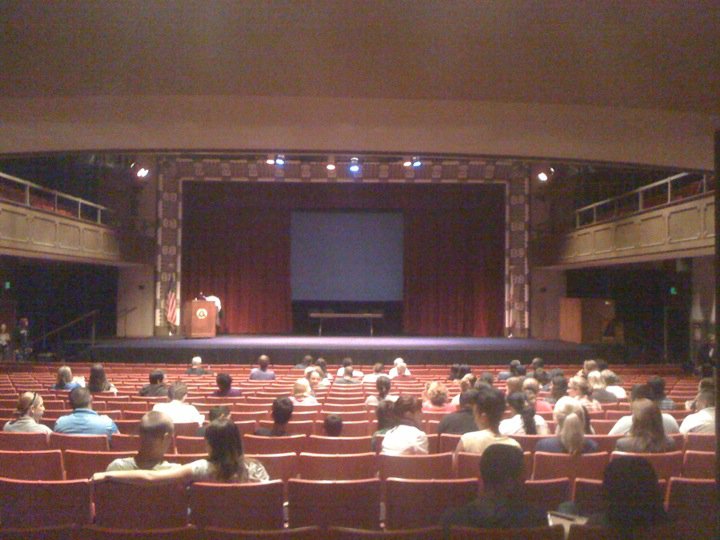
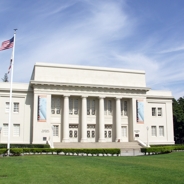 Above: Spacious interior of auditorium in Memorial Hall. Right: Exterior.
Above: Spacious interior of auditorium in Memorial Hall. Right: Exterior.
What I can tell you is that the Chapman students are also being deprived. Five out of the nine comments to the announcement on the school website (as of this writing) were from confused students wanting to know if they could attend Wiesel’s Thursday night speech at Memorial Hall. This was the answer they got:
The 7 p.m. Evening of Remembrance at Memorial Hall is open to the public, but advance registration was required and due to the popularity of this event, all seats are reserved at this time. But there is a chance that some stand-by seating may be available just prior to the start time. Likewise, stand-by seating may be available at Friday’s “Conversation with Elie Wiesel” at 11 a.m. in the Fish Interfaith Center.
I’m sure the majority of students at Chapman don’t get even a glimpse of Wiesel during his week-long stay, let alone have the privilege of suffering through one of his “conversations.”
Today being Friday, it is all over now. Even though Wiesel’s contract runs through Sunday, he’s probably completed all he has to do to earn his … what? $25,000.00? Or more? Maybe 5 times $25,000. Is that possible? Sure it is … with all those rich, uh, Californians.
Monday, April 4th, 2011
By Carolyn Yeager
Cliches are all Chapman students get from the Master of Platitudes’much-ballyhooed visit.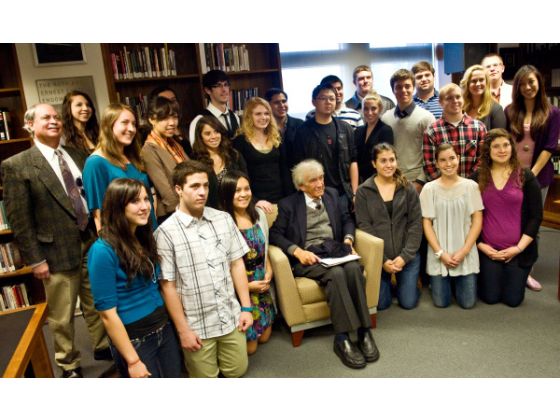 Above: Elie Wiesel looks frail in this group photo taken after he spoke to students at the Sala and Aron Samueli Holocaust Memorial Library at Chapman University. (Photo credit: Orange Country Register)
Above: Elie Wiesel looks frail in this group photo taken after he spoke to students at the Sala and Aron Samueli Holocaust Memorial Library at Chapman University. (Photo credit: Orange Country Register)
The Los Angeles Times sent its own reporter to cover the Holocaust Hero’s grand arrival at Chapman University during the first week of April. The Local section of the newspaper had a report on Wiesel’s visit with 21 students in the specialized Holocaust Library on the campus.
Wiesel has fewer answers these days (not much is expected of him) and speaks in a sort of cliché-language that he has mastered. He can be confident his listeners will supply a profound meaning to any utterance that comes forth from his mouth. For example:
One (student) wanted to know how Wiesel managed to overcome the memories of the deaths of his father, mother and sister to write his first book, “Night,” an autobiographical account of … Nazi concentration camps.
With deep sadness in his eyes, Wiesel replied, “Only those who were there know what it was like. We must bear witness. Silence is not an option.”
Wiesel did not really like this question and gave a short answer that was not an answer at all. The question was: How did he overcome the [painful] memories in order to write his book? His actual answer, interpreted, was: “I won’t, or I can’t, answer your question.” We can ask why he won’t answer that question, and also why he has not ever answered that question. Could it be because he has no idea how to answer it since such a thing did not actually happen to him?
To make it sound like he’s giving some kind of answer, he adds two things that have nothing to do with the question: “We must bear witness” and “Silence is not an option.” These are both favorite sayings typically associated with him. Upon hearing him say them, his listeners are satisfied that they are hearing the real Wiesel, that they are blessed by a “transforming” moment.
Another question was more to Wiesel’s liking. “How can this generation preserve what you learned there?”
Wiesel brightened as he said, “Listen to the survivors. They are an endangered species now. This is the last chance you have to listen to them. I believe with all my heart that whoever listens to a witness becomes a witness. Once we have heard, we must not stand idly by. Indifference to evil makes evil stronger.”
More platitudes. But a reader brought to my attention that Wiesel is contradicting something he said on another occasion. Even though we know contradictions are the usual fare from this man, it’s of note that in a 1978 interview with the New York Times, Wiesel pronounced:
“The Holocaust [is] the ultimate event, the ultimate mystery, never to be comprehended or transmitted. Only those who were there know what it was; the others will never know.”*
This fits his first answer, but not his second. So, is it that “only those who were there know what it was like” (meaning it’s impossible to transmit to others), or is it that we can all “become a witness” (and speak with authority about what it was like)?
If you really want the truthful answer, dear readers, it is whatever benefits the Holocaust Industry. That is the whole reason Elie Wiesel goes to Chapman University—to create publicity for Holocaustianity—since he adds no real value to the students’ learning. Still, it’s all taken very solemnly by the faculty, the mainstream media, and the impoverished students themselves, who don’t realize how they’re being cheated. In a university setting, they are expected to swallow whole whatever they hear from iconic sources re the holocaust. The real questions they have are not answered. It is a farce of education. This Presidential Fellowship shows us once again, when it comes to Elie Wiesel it is always “much ado about nothing.”
*Elie Wiesel, “Trivializing the Holocaust”, New York Times, 16 April 1978, p. 2:1 [Article written in response to the original airing of the NBC miniseries The Holocaust]; quoted in Peter Novick, The Holocaust in American Life, 1999, p. 211.
5 Comments
Category Featured | Tags: Tags: Chapman University, Distinguished Presidential Fellow, Elie Wiesel, Sala and Aron Samueli Holocaust Memorial Library,
Social Networks: Facebook, Twitter, Google Bookmarks, del.icio.us, StumbleUpon, Digg, Reddit, Posterous.
Wednesday, March 30th, 2011
by Carolyn Yeager
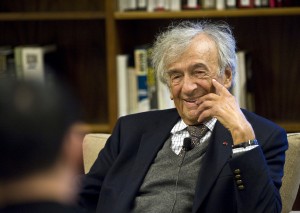 Elie Wiesel arrived at Chapman University in Orange CA on Monday, March 28 in his new capacity as “Distinguished Presidential Fellow” and gave a lecture titled “Knowledge and Ethics.” He also spoke to a small class of Chapman Religion students. According to the Orange County Register [photo at right courtesy Paul Bersbach, OCR], he “answered several questions, but posed many of his own.” This is typically the way Wiesel, 82, avoids revealing his ignorance of the entire topic of the concentration camps.
Elie Wiesel arrived at Chapman University in Orange CA on Monday, March 28 in his new capacity as “Distinguished Presidential Fellow” and gave a lecture titled “Knowledge and Ethics.” He also spoke to a small class of Chapman Religion students. According to the Orange County Register [photo at right courtesy Paul Bersbach, OCR], he “answered several questions, but posed many of his own.” This is typically the way Wiesel, 82, avoids revealing his ignorance of the entire topic of the concentration camps.
Wiesel’s contract with the university, and specifically with the Rodgers Center for Holocaust Education which is the real sponsor and driving force behind the contract, is for five years. Thanks to a bequest from Barry and Phyllis Rodgers, the Rodgers Center was opened in 2000 for the purpose of helping to keep the memory of the holocaust alive, well, and lucrative.
As we reported here last October, each spring semester Wiesel will deliver a lecture and carry on some interaction with students. Don’t think he’s doing it only in the interest of “keeping memory alive” or for any of the noble reasons suggested by Marilyn Harran, Director of the Rodgers Center and University spokesperson on matters pertaining to Wiesel’s fellowship.
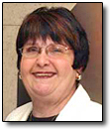
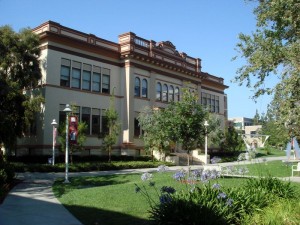
Left: Marilyn Harran. Right: Wilkinson Hall on the Chapman campus. The Rodger Center comes under the aegis of the Wilkinson College of Humanities and Social Studies.
As reported in the Chapman Panther newspaper on March 28, “Harran declined to say how much the Rodgers Center is paying Wiesel for his lecture. Mary Platt, director of communications and media relations, confirmed that the amount is confidential.”
It’s widely quoted that Wiesel’s standard speaking fee is $25,000. We don’t know how much he is charging for visiting with students in their classrooms, but it is no doubt substantial. Chapman’s wealthy Jewish donors who support activities at the special Rodgers Center for Holocaust Education and the Samueli Holocaust Memorial Library are apparently willing to pay it.
Harran, a professor in both the Religious Studies and History departments, is a devotee of Wiesel and his myth. She tends to speak of Wiesel in worshipful terms, as I reported in my Oct. 2010 blog post. At that time, she included these words in her announcement of his fellowship at Chapman: “We are unbelievably fortunate that he has chosen to return to Chapman and to share with us his knowledge and wisdom. I am stunned and deeply grateful that he will be with us in this new role as Distinguished Presidential Fellow. I know our university community will be profoundly enriched and inspired by his presence.” This is the cue for students to show the proper respect toward the visiting professor, and hang on his every word.
Harran is teaching a course this semester called “Elie Wiesel: His Life and Work” with Jan Osborn, professor of English. According to The Panther, only eighteen students are taking the course. Harran wrote a March 28th opinion piece for the school newspaper titled “Knowledge, ethics and Elie Wiesel” in which she mentioned his book Night and also said: “Some of you will recall seeing Wiesel visiting Auschwitz with Oprah Winfrey or standing by President Obama’s side at a commemorative ceremony in Buchenwald. These are powerful images. Indeed, it is hard to remember when the memory of the Holocaust did not have a place in our American life and culture. There are Holocaust documentaries and films; Holocaust museums in cities such as Chicago, Houston and Los Angeles, and the Sala and Aron Samueli Holocaust Memorial Library at Chapman. And there is the United States Holocaust Memorial Museum in Washington, D.C.”
Hurrah, hurrah. Isn’t it wonderful. She gives Wiesel much of the credit for bringing this about. She then asserts this historical tidbit: “the Final Solution was agreed upon in a 90-minute meeting attended by 15 senior SS officials and bureaucrats”—referring to the reputed “Wannsee Conference” in 1942 in Germany. But the meeting minutes show clearly that it was a discussion of the “final solution of the Jewish problem” as a deportation plan, not an extermination plan. So where does that leave Elie Wiesel’s story? And Harran is a PhD in History? It’s obvious she needs some help with knowledge and ethics herself.
Wiesel told the religion students that he studied literature at the Sorbonne University in France before he became a journalist for the Israeli paper Yediot Arhronot in Dec. 1949. I have shown in Questions on Elie Wiesel and the Sorbonne that that claim is false. Wiesel also told the students he cannot answer the questions: Why did the Holocaust happen? and Why did it happen to the Jews? But … “since I have survived, I feel I have a duty to do something with myself.”
In all their discussions of ethics, the pressing current persecution and torture of the Palestinians by Israel is never brought up. EWCTW will continue to report to you about Wiesel’s activities at Chapman. Contributions sent by readers are welcome.
* * *
Also see: Beyond Sensationalism: Writer Discusses Holocaust Literature. Ruth Franklin is on the book circuit trying to explain why holocaust memoirs are so full of fiction.
“From the very moment, it is imagination at work,” explained the writer. “There’s this myth that Holocaust texts emerged fully-formed from their creators. However, so much rewriting was done to tell the story in a more effective, memorable way.” Uh huh. sure.
2 Comments
Category Featured | Tags: Tags: Chapman University, Distinguished Presidential Fellow, Marilyn Harran, Rodgers Center for Holocaust Education, Ruth Franklin, Sorbonne,
Social Networks: Facebook, Twitter, Google Bookmarks, del.icio.us, StumbleUpon, Digg, Reddit, Posterous.
Monday, January 10th, 2011
Has conformism completely overtaken free, questioning, adversarial minds on today’s university campuses?
February 1st is the deadline for us to receive essays in our “A Question of Ethics” Essay Contest, for which we have $1000.00 set aside for prizes. That is just 21 days from the date of this posting, yet we have not, as of this date, received even one.
Can it be that $500.00, $250.00 and $125.00 doesn’t tempt even a few students out of the thousands at Boston and Chapman Universities, where we have advertised our contest? According to the odds, we could expect at least a handful who would be independent enough, and smart enough to figure out that the fewer the entries, the greater the chance of winning. After all, the prize essays would not necessarily have to be of doctoral dissertation quality! They would only have to follow the evidence presented on this website, use proper grammar and punctuation, and be posted here with the winner’s name. Ay, there’s the rub.
Your name and your essay will be posted on this site. What sort of retaliation by teachers, administrators, and your fellow students would you have to endure? And would the stigma follow you for the rest of your life? Might you possibly have difficulty, as someone identified as flirting with “holocaust denial”, with that post-graduation trip to Europe that you’re hoping to make? The idea of such repercussions makes even the $500 of little value, and the intellectual challenge that may have lit a small fire in your mind is easily damped down and put out. Why chance it? The drawbacks outweigh the benefits.
Yes, we understand. We offered this essay contest for straightforward reasons, but we also knew it would be a good lesson in how the weight of political correctness on our college campuses, particularly around this issue and even more particularly around the person of Elie Wiesel, is strangling freedom of thought, freedom of intellectual pursuit in areas of politically-enforced belief structures, and freedom to express your “different” views openly.
Our contest will either bear fruit in the form of essays to read, judge and discuss, or it will bear fruit as an example of the suffocating, silencing effect of the politically-enforced “new religion” of our time—the sacred, unquestioned memory of “holocaust survivors.” But bear fruit it surely will. It is up to you, students of Boston University and Chapman University in Orange CA, which it will be.
Herewith, for the last time, is our original announcement:
“A Question of Ethics” Essay Contest announced for Boston and Chapman University students; $1000 in prizes
We are pleased to announce the first East Coast—West Coast “A Question of Ethics” Essay Contest for students enrolled at Boston University in Massachusetts and Chapman University in Orange, California.
The winning essay will be awarded $500; second prize will receive $250; two honorable mentions $125 each. The winning essays will be published on the web site Elie Wiesel Cons The World.
The essays must analyze one or more ethical issues surrounding Elie Wiesel as they are presented on the pages of the website Elie Wiesel Cons The World. These issues may include [not in order of importance]
- Prof. Wiesel’s refusal to show his claimed tattoo.
- The documents from Buchenwald that do not support Wiesel’s presence there.
- His claim to be in the famous Buchenwald Liberation Photo when, according to his book, he was deathly ill in the hospital at the time.
- His close association with the Irgun terrorist gang in the late 1940’s.
- The questions surrounding the authorship of his first book, Un di Velt Hot Gesvign, allegedly 866 pages written in less than two weeks while on a ship crossing the Atlantic.
- The insistence that his book Night, read by school children all over the world, is a factual account of his experience at Auschwitz and Buchenwald.
Though the essays must utilize the information made available on Elie Wiesel Cons The World, information from other sources is acceptable as additional material. Our objective is for the essayists to examine the ethics challenges facing Prof. Wiesel in light of the information we have provided at our website.
Deadline for essays to be received is Feb. 1st, 2011. To be considered for a prize, essays must be a minimum of 500 words. Proof of registration as a student at Boston or Chapman University must accompany the essay. This can be a copy of one’s current semester course registration along with a University ID card. Manuscripts should be emailed to [email protected] with the subject line: Ethics Essay Contest.
Contact:
Carolyn Yeager
c/oCODOH, PO Box 439016
San Ysidro, CA 92143
Email: [email protected]
Web: www.eliewieseltattoo.com
No Comments
Category Featured | Tags: Tags: Boston University, Chapman University, essay contest,
Social Networks: Facebook, Twitter, Google Bookmarks, del.icio.us, StumbleUpon, Digg, Reddit, Posterous.
Friday, October 29th, 2010
by Carolyn Yeager
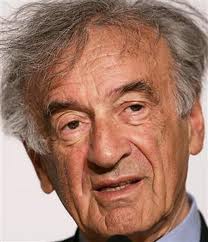
Elie Wiesel will “spend time” at Chapman University in Orange, California beginning this spring and for the following four years, through 2015, according to Chapman President Jim Doti. Wiesel has been appointed as a “Distinguished Presidential Fellow”, which means he will visit classes in Chapman’s Holocaust history minor, and possibly other disciplines, including history, French, religious studies and literature, according to chapmannews.
Chapmannews reports that complete plans for his fellowship activities are still in progress (as of August) and that he will retain his full-time faculty position at Boston University. As we have pointed out on this website, Wiesel’s duties at BU are light, leaving him time for his extra-curricular activities, now including being employed by a second university. However, Wiesel’s fellowship stay is also described as amounting to only “several days each spring.” My! “Visit” is certainly the right word for it.
“Distinguished Presidential Fellow” may be a newly invented position, meaning that he is appointed by the President (Jim Doti), not hired under academic requirements by a department dean. Wiesel will be what you might call, in diplomatic terms, an at-large representative of the Jewish interests that are no doubt paying his salary. He will be most closely associated with Chapman’s Rodgers Center for Holocaust Education, a unique construction that bridges the Religion and History Depts, and was opened in Feb. 2000 “through a generous gift from Barry and Phyllis Rodgers, [and] dedicated to preparing young people to become witnesses to the future.” Witnesses of the Holocaust? Is this the job of a university? Well, it seems to depend on who offers the money, and what they want it to be used for.
Wiesel offered special words of praise to Dr. Marilyn Harran, who directs the Rodgers Center for Holocaust Education, for “the way in which the university is teaching and remembering some of the most tragic events in human history, events that have had such a deep influence upon my life.” She and the Center are the reason that Wiesel says he “made the decision to return to Chapman annually as Distinguished Presidential Fellow.”
Dr. Harran is a professor of both history and religious studies at Chapman. She has even stronger words of praise for Wiesel, announcing, “[he] has been the face and voice of Holocaust memory and witness to the world, and an ambassador of humanity and hope for decades. He has consistently challenged us to learn from the Holocaust and to reject indifference, and – in his words – ‘to think higher and feel deeper.’ We are unbelievably fortunate that he has chosen to return to Chapman and to share with us his knowledge and wisdom. I am stunned and deeply grateful that he will be with us in this new role as Distinguished Presidential Fellow. I know our university community will be profoundly enriched and inspired by his presence.”
University President Doti is equally humbled by the presence of the great man, saying “That this remarkable individual, one of the world’s most famous and respected people, one who truly exemplifies the meaning of ‘global citizen,’ should choose to return to spend time with our students is truly a tremendous honor for Chapman.”
Does it seem from this that Wiesel will be under any kind of performance requirement at Chapman, or will he be the determiner of his own course of action? It is probably the same at Boston University – the tail is wagging the dog. But Wiesel’s presence at both universities is more a public relations benefit to the school than an educational benefit for students. His fame as a Holocaust icon, including his Nobel Peace Prize, make him a valuable commodity – as opposed to having any pretensions to scholastic stardom.
Chapman University is seeking to transition from a “teaching university” to a “research university.” That means the faculty will be required to “publish” in the field of their expertise, and the more you publish, the higher your pay. Not all faculty think this will be beneficial to the student experience at Chapman; there is a school of thought that values professors as mainly teachers rather than researchers. But others, probably more powerful, think it’s more important to “upgrade” Chapman into a higher-rated university.
Emphasis on the Holocaust
Elie Wiesel’s visiting fellowship may be in accord with those objectives. The Sala and Aron Samueli Holocaust Memorial Library opened in April 2005, dedicated to providing a space “where teachers and students may gather to learn from survivors, visual testimonies and printed resources.” At the entrance to this library is a large bronze bust of – guess who? Elie Wiesel! 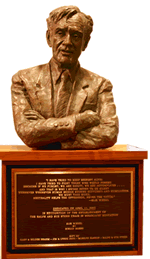 The library has an exhibit area that currently displays “Themes of the Holocaust” featuring photos and artifacts donated or lent by individuals and institutions. Group tours are also arranged. It’s like a little Holocaust museum right there on the university grounds.
The library has an exhibit area that currently displays “Themes of the Holocaust” featuring photos and artifacts donated or lent by individuals and institutions. Group tours are also arranged. It’s like a little Holocaust museum right there on the university grounds.
At Chapman, the Holocaust is taught in both the Religion and History Depts., and several of the courses overlap both. It is really quite amazing how much of the History curriculum is devoted to this subject. That Holocaust is taught in the Religion Department—as it is at Boston University—makes sense because it is a belief. It has become an unquestioned, highly enforced belief system that is assumed to be true at its base, but with too little examination of the basic operations it would require.
A difference in approach at Chapman however, as compared to BU, is the emphasis on Holocaust in the History Dept. I discovered six courses containing Holocaust, five of them devoted exclusively to it. This is a lot for a small university like Chapman, perhaps more than at any other accredited university in the United States. The History Dept. offers on an every-year basis:
HIST 307 Germany and the Holocaust
(Same as REL 307.) This course examines the Holocaust within the context of the history of World War II. Topics include the origins of the Holocaust, the implementation of the Final Solution, resistance to the Nazis, survivor experiences, and the legacy of the Holocaust. (Offered every year.) 3 credits. Also offered in Religion
HIST 365 Topics in the Holocaust
(Same as REL 365.) This course examines selected topics within the study of Holocaust history, such as the roles of doctors, theologians and religion under Hitler, the persecution of non–Jewish groups (including homosexuals and gypsies), and the experiences and choices of perpetrators, victims, and bystanders. Courses that treat different themes may be repeated for credit. (Offered every year.) 3 credits. Also offered in Religion
HIST 365a Perpetrators, Witnesses, and Rescuers
[Same as REL365a] Within the context of Nazi Germany, World War II and the Holocaust, this course examines the choices that individuals faced and the decisions that defined them as perpetrators or rescuers. Includes the stories of those who survived the Holocaust to become witnesses to the truth. (Offered every year.) 3 credits. Also offered in Religion
Offered every other year, Spring semester:
HIST 365b The Holocaust: Memoirs and Histories
This course explores the complex history of the Holocaust from the perspective of selected memoirs written by survivors and examines the contributions and limitations of memoirs in shaping the historical record. (Offered spring semester, alternate years.) 3 credits.
The following two courses are offered “as needed:”
HIST 356 Modern Germany: From Sarajevo to Stalingrad
This course examines the political, social, and intellectual history of Germany from World War I to the end of World War II. Topics include the Holocaust and the roles of individuals in taking Germany down the path to two world wars. (Offered as needed.) 3 credits.
HIST 297 The Holocaust in History and Film
An introduction to the history of the Holocaust, from initial persecution to the implementation of the Final Solution, including the actions of perpetrators, rescuers, and resisters; the dilemmas facing those targeted for persecution, and major issues in the interpretation and visual representation of the Holocaust. (Offered as needed) 3 credits.
* * *
The Religion Dept. at Chapman offers three courses every year that are also offered in History:
REL 365 Topics in the Holocaust
(Same as HIST 365.)
REL 365a Perpetrators, Witnesses, and Rescuers
(Same as HIST 365A.)
REL 307 Germany and the Holocaust
(Same as HIST 307.)
In addition to all of this, there is the extensive program offerings of the Rodgers Center for Holocaust Education, which is entirely funded by several Jewish groups outside the university. According to the Chapman website, the mission of the Rodgers Center is to increase knowledge of the Holocaust, further discussion of the causes of genocide, and encourage reflection on the contemporary relevance of the Holocaust to our lives today.
As part of its mission, the Center sponsors a Lecture Series each year. For example, on Sept. 21 James Young gave a lecture entitled “Stages of Memory: Challenges of Memorialization (sic) from the Holocaust to the World Trade Center.” Young is Professor of English and Judaic Studies at the U of Mass, Amherst. He has written two books about the Holocaust: one about Holocaust Memorials and one about Holocaust Architecture. [Isn’t Holocaust to the World Trade Center quite a stretch? -cy]
The Art and Writing Contest is an annual program that involves “thousands of Southern California middle and high school teachers and students, culminating in an awards ceremony on campus.
Beginning in 2000, the Rodgers Center began a yearly Evening of Holocaust Commemoration to create a “community of witnesses” for the Chapman area.
What more can they think up?!
No one can deny that Holocaust is alive and well at Chapman University. And now Elie Wiesel, the “Grand Poobah” himself, will arrive every spring to energize it even further, and bring lots of media attention in his wake. This is a public relations dream!
But for those of us who care about the truth, it’s more like a nightmare. What do you think, dear reader?
4 Comments
Category Featured | Tags: Tags: Chapman University, Distinguished Presidential Fellow, Marilyn Harran, Rodgers Center for Holocaust Education, Sala and Aron Samueli Holocaust Memorial Library,
Social Networks: Facebook, Twitter, Google Bookmarks, del.icio.us, StumbleUpon, Digg, Reddit, Posterous.
 Elie Wiesel did not have a visit with Chapman University students this spring. Up until this year, he had completed only two years of his five-year appointment as a Distinguished Presidential Fellow at the university. 2013 would have been year three. Wiesel previously arrived at the end of March or in April for about five days. Now it is already June and school is out.
Elie Wiesel did not have a visit with Chapman University students this spring. Up until this year, he had completed only two years of his five-year appointment as a Distinguished Presidential Fellow at the university. 2013 would have been year three. Wiesel previously arrived at the end of March or in April for about five days. Now it is already June and school is out.









